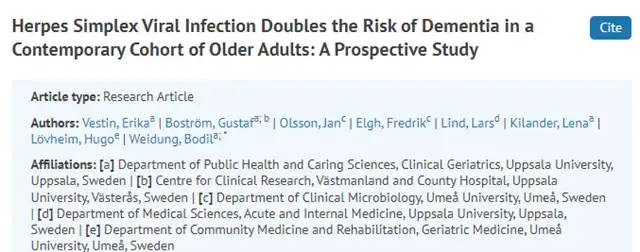Study Finds Common Herpes Virus Doubles Risk of Dementia
- Normal Liver Cells Found to Promote Cancer Metastasis to the Liver
- Nearly 80% Complete Remission: Breakthrough in ADC Anti-Tumor Treatment
- Vaccination Against Common Diseases May Prevent Dementia!
- New Alzheimer’s Disease (AD) Diagnosis and Staging Criteria
- Breakthrough in Alzheimer’s Disease: New Nasal Spray Halts Cognitive Decline by Targeting Toxic Protein
- Can the Tap Water at the Paris Olympics be Drunk Directly?
Study Finds Common Herpes Virus Doubles Risk of Dementia
- Should China be held legally responsible for the US’s $18 trillion COVID losses?
- CT Radiation Exposure Linked to Blood Cancer in Children and Adolescents
- FDA has mandated a top-level black box warning for all marketed CAR-T therapies
- Can people with high blood pressure eat peanuts?
- What is the difference between dopamine and dobutamine?
- How long can the patient live after heart stent surgery?
Study Finds Common Herpes Virus Doubles Risk of Dementia
A new study suggests that infection with the primary virus that causes cold sores may double the risk of developing dementia. In addition to mounting evidence linking the two, further research is needed to determine if antiviral treatment for herpes simplex virus (HSV) could reduce this risk and open doors to developing new vaccines.
Herpes simplex virus (HSV) is a common lifelong infection that can be treated but not cured. It’s estimated that about 67% of the global population under 50 years old is infected with herpes simplex virus type 1 (HSV-1), the main cause of oral herpes or cold sores, and about 13% are infected with herpes simplex virus type 2 (HSV-2), the main cause of genital herpes.
Another epidemic, dementia, is also on the rise, with an estimated 78 million cases globally expected by 2030. Alzheimer’s disease (AD) is the most common form of dementia, and while its exact cause is unclear, increasing evidence from large population studies suggests that HSV infection plays a role in the onset of Alzheimer’s or dementia. Researchers at Uppsala University in Sweden have now studied the link between HSV infection and the risk of dementia.
“The particular strength of this study is that the participants were roughly the same age, which makes the results more reliable because age differences would not confuse the results, and age differences are related to the onset of dementia,” said Erika Vestin, the lead author of the study.
The study tracked 1,002 70-year-olds who did not have dementia for up to 15 years. Blood samples were analyzed to detect anti-HSV and anti-HSV-1 IgG antibodies, anti-cytomegalovirus (CMV) IgG, anti-HSV IgM antibodies, and levels of anti-HSV and anti-CMV IgG.

Immunoglobulin M (IgM) is the first antibody secreted by the adaptive immune system upon initial exposure to foreign antigens. Immunoglobulin G (IgG) is the most common type of antibody in the blood and can bind to pathogens like viruses and bacteria, preventing infection. The presence of IgG in the blood can indicate infection with HSV (or being a carrier), while detection of IgM and higher levels of IgG reflect frequent reactivation. CMV is another herpes virus, and its relationship with the risk of attention deficit disorder or dementia has been studied.
During the study, 7% of participants developed all-cause dementia, and 4% developed attention deficit disorder. The study found that 82% of participants were carriers of anti-HSV IgG, with 6% receiving antiviral treatment for herpes simplex virus.
Researchers found that being positive for anti-HSV IgG was associated with more than a twofold increased risk of dementia. Although the hazard ratio (a measure of how often a particular event occurs in one group compared to another) was similar for dementia, researchers did not find a significant association with attention deficit disorder.
Rates of anti-HSV IgM and anti-CMV IgG infection, antiviral treatment for herpes simplex virus, and levels of anti-HSV and anti-CMV were unrelated to attention deficit disorder or dementia. The rate of anti-HSV IgG infection was also not interacted with apolipoprotein E4 (a protein associated with Alzheimer’s disease) or anti-CMV IgG.
Researchers said that the lack of association between levels of anti-HSV IgG and attention deficit disorder or dementia, and the association between anti-HSV IgG carriage and dementia, suggests that the presence of IgG rather than the level indicates a risk of dementia.
Vestin said, “It’s exciting that these results confirm previous studies. Increasing evidence suggests that, as our study shows, herpes simplex virus is also a risk factor for dementia.”
Researchers noted that the lower incidence of attention deficit disorder may affect the statistical power to detect correlations. While HSV appears not to interact with CMV or APOE e4, further research is needed to detect potential interactions. Randomized controlled trials are also needed, rather than observational studies, to investigate whether known drugs for treating HSV can reduce the risk of dementia and the possibility of developing new vaccines.
These findings could drive further research into dementia, using common antiviral drugs for herpes simplex virus early in the disease’s progression or as a preventive measure before the disease occurs.
The study was published in the journal Alzheimer’s & Dementia.
Study Finds Common Herpes Virus Doubles Risk of Dementia
(source:internet, reference only)
Disclaimer of medicaltrend.org
Important Note: The information provided is for informational purposes only and should not be considered as medical advice.



